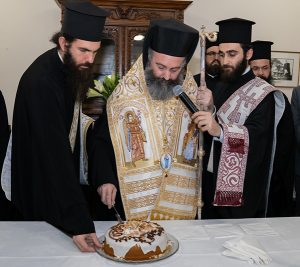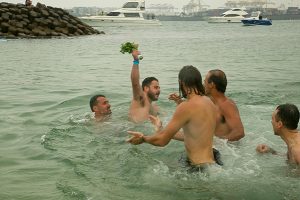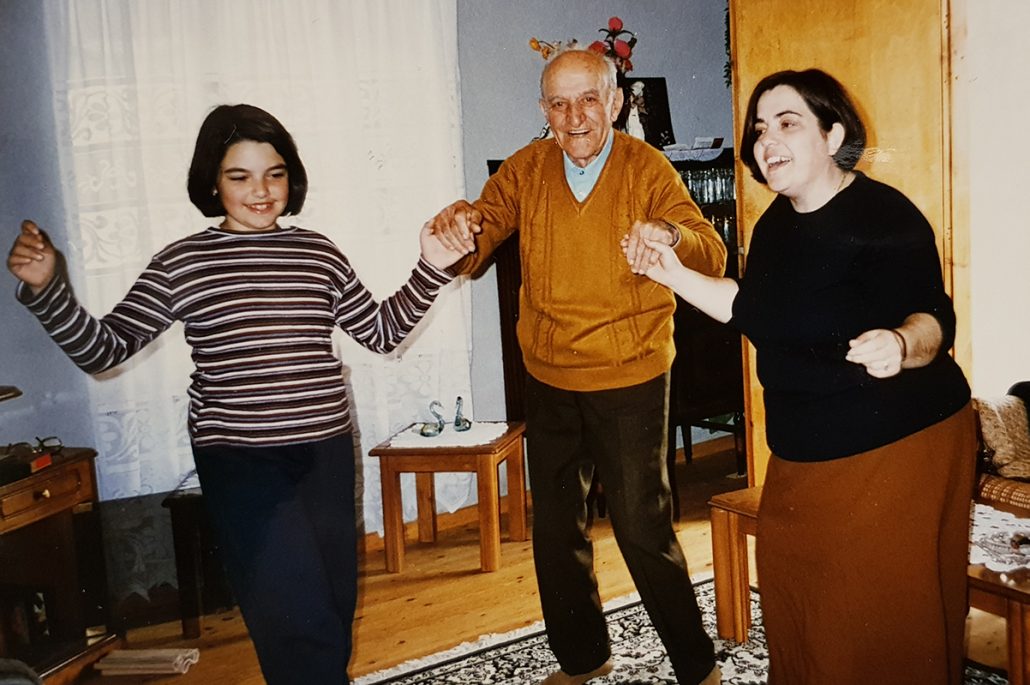The Feast of the Nativity of our Lord is not just a one-day event, but an extended celebration spread out over many days (indeed, months!).
We begin with a period of preparation – extending for 40 days – followed by the Nativity and the “Twelve days of Christmas”, followed by the great feast of Epiphany. Before, during and after this time there are a number of other feasts:
* St Nicholas is commemorated on 6 December. He was an Orthodox bishop in the city of Lycea on the coast of Asia Minor (modern-day Turkey) in the 4th century, renowned for his philanthropy and gift-giving. The English-speaking world dimly remembers him as a gift giver under his Dutch name “Sinta (Saint) Nicklaus” (or simply “Santa Claus”). He remains a very popular saint amongst the Orthodox and many are named in his honour. In Greece, it is customary to decorate a boat rather than a tree, at this time of year, in honour of St Nicholas (who is also the patron saint of sailors).
In conjunction with the Nativity (25 December), we also celebrate the following Feasts:
* The Ancestors of God (Sunday before the Nativity)
* The Virgin Mary (26 December)
* The Joseph, King David, and James, the Brother of God (Sunday after the Nativity).
Thus, we also celebrate Jesus’ entire family according to the flesh at this time.
The first day of January is also an important day, being the eighth day after the Nativity and hence the day of his circumcision. This is a great feast where we commemorate our Lord’s humility and the significance of the fact that he first bled for humanity.

Cutting a Vasilopita (St Basil’s Pie) – a cake with a gold coin hidden inside.
This day is also the feast day of St Basil – another great philanthropic Orthodox bishop of the 4th century. We typically celebrate this occasion with the cutting of a Vasilopita (“St Basil’s Pie”) – a cake with a gold coin hidden inside. It is cut into pieces and distributed, and the person who receives the piece of cake with the coin receives that coin as a blessing.

Celebrating the blessing of the waters.
* The Epiphany (6 January) commemorates the manifestation of the Trinity at the Baptism of our Lord. On this day we have the “blessing of the waters” ceremony, in which the Holy Spirit is invoked to sanctify water that the priest then uses to bless people and homes. At this time, the priest will visit the homes of the faithful and sprinkle the holy water in their homes as a blessing for the year ahead.
At Epiphany, all the Orthodox parishes in the region gather at the local beach, river or lake to celebrate the blessing of the waters together. A cross is thrown into the water and there is a race to be the first to retrieve it. In the Northern Hemisphere, the clergy and faithful often brave the cold to participate in this ceremony. In parts of Russia, they have to cut holes in the ice!
Throughout this period, people go from house to house singing traditional Orthodox carols – not for the Nativity only, but for St Basil and Epiphany.

Traditional family meals are celebrated at all these major feasts. Extended families are often quite close-knit and will celebrate these occasions together. It is fitting that, at a time when we are honouring our Lord’s family, we also honour our own.
At these traditional family gatherings, it is expected that unexpected visitors will arrive – much to the delight of their hosts! This is known as “Abrahamic hospitality”, after Abraham, who begged to host the passers-by, and then scrounged to feed them whatever food they could find (Genesis 18:1ff). Our Lord himself reaffirms this in the parable of the sheep and the goats (Matthew 25:31–46), where he says, I was hungry and you gave me something to eat … I was a stranger and you invited me in, making Abrahamic hospitality a basis for the last judgement. He made it clear that it was not just Abraham who received strangers that turned out to be messengers of God, but that every time we feed someone or receive a stranger, it is as if we had received a messenger of God. It is for this reason that the Orthodox value hospitality so highly – they see the face of Christ in their fellow human beings, and know that when they are serving them, they are serving him.
The feasts of the Church are great opportunities for such hospitality. On days where people are celebrating their patron saint, it would not be unusual for a home to receive the entire village. For a common name like St Nicholas or St Basil, there’s likely several homes with a “Nicholas/Basil”, and the whole village will visit all of them! On major feasts like the Nativity and Epiphany, where everyone is celebrating, it would be normal for the entire village to visit everyone else in the village throughout the day (or even days). The celebration is thus truly a communal event, with everyone coming together as brothers and sisters in Christ.

